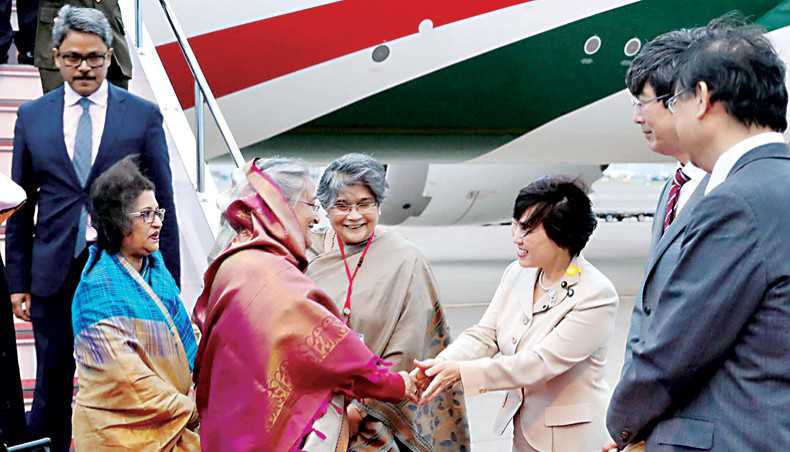Japan was always close to my heart: PM

Japanese state minister for foreign affairs Toshiko Abe welcomes prime minister Sheikh Hasina at Haneda International Airport at Tokyo on Tuesday. — Focus Bangla photo
Prime minister Sheikh Hasina has shared her fascination with Japan since childhood ahead of her official visit to East Asian country, and said this came from Bangabandhu Sheikh Mujibur Rahman.
‘From my childhood, I have had a fascination with Japan. I used to collect Japanese art, calendars, stamps, dolls, etc. Japan was always close to my heart,’ she wrote in an article published in the Japan Times on Monday.
She added, ‘This was transmitted to me from my father. I share his aspiration to transform my country to be another Japan. A new era with hope and harmony has begun in Japan. Let the new era bring us closer, connect us deeper and help us build a safe and prosperous world for our children.’
Sheikh Hasina said Japan and Bangladesh had always enjoyed a close relationship based on mutual trust and cooperation.
Saving money from their meals, she said, Japanese students stood beside the Bangladeshis during the Liberation War and Japan was one of the first countries to recognise Bangladesh on February 10, 1972.
‘There is close resemblance between our flags. Our father of the nation, Sheikh Mujibur Rahman, used to say the Japanese flag reminds him of the land of the rising sun and ours recalls the independence gained by sacrificing millions of lives and our green field.’
‘Bangabandhu inspired us to follow the Japanese transition process from agrarian to industrialisation, focusing on farm mechanisation. The strong foundation of our relations was laid by Mujib through his historic visit in October 1973,’ she wrote.
The prime minister said the phenomenal socioeconomic development of Bangladesh over the last decade is cited as a development miracle by the global community.
‘Our people-centric development model based on leaving no one behind has been the key to achieving this miracle. Bangladesh has achieved 6.5 percent economic growth over the last decade, is expecting 8.13 per cent growth this year and is aiming for double-digit growth soon,’ she said.
Sheikh Hasina said based on the success of ‘Vision 2021’, Bangladesh now aspires to become a developed country by 2041.
‘Transforming our young generation into valuable human resources for the global supply chain will be a key component to realising this target,’ she said.
The prime minister said that her government had undertaken major infrastructure development schemes to ensure energy security, food security and a better standard of living for our people. ‘We have planned to set up 100 special economic zones, including one for Japanese investors.’
‘While in the opposition, I took the opportunity to build a personal relationship with Japanese political leaders by participating in an international conference in 1992,’ the prime minister said.
‘During my first official visit as prime minister in 1996, Japan committed to help build the Padma and Rupsha bridges. Rupsha Bridge was constructed by Japan and a feasibility study of Padma Bridge was conducted. At that time, parliamentarians and friendship committees were formed to strengthen people-to-people relationships,’ she said.
Sheikh Hasina said since 1972, Bangladesh received $ 11.3 billion in official development aid from Japan, making Japan ‘our largest bilateral development partner’.
She said Japanese contributions had been instrumental in various areas of infrastructure development, including the Karnaphuli Fertiliser Company Ltd, the Pan Pacific Sonargaon Hotel and water supplies in major cities.
‘Meanwhile, our people residing in Japan are also contributing to Japanese economic development,’ she wrote.
‘We are very encouraged to see that Japanese entrepreneurs are demonstrating more enthusiasm about business and investment opportunities in Bangladesh,’ Sheikh Hasina said.
Presently, she said, 280 Japanese firms were operating in Bangladesh, an increase of 10 times over the last decade.
The prime minister said different surveys conducted by Japanese institutions revealed that the confidence of Japanese-affiliated firms in doing business in the country was improving.
‘The launch of the Japan-Bangladesh Public-Private Economic Dialogue has significantly contributed to strengthening business and investment ties between the two countries including six projects under public-private partnership in government-to-government cooperation,’ she wrote.
Sheikh Hasina said enhancing the ease of doing business was one of the prerequisites for attracting foreign investment.
So, she said, the One Stop Service Act was enacted in 2018 with a view to delivering various essential services to investors from the same point. Bangladesh offers the most liberal and congenial investment regime in South Asia.
The prime minister said Bangladesh welcomed foreign private investment in almost all sectors of the economy with no restriction on the amount of investment.
‘Foreign investors are eligible to take advantage of a wide range of generous tax concessions and other fiscal incentives. We have bilateral investment treaties with 32 countries and Avoidance of Double Taxation treaties with 28 countries, including Japan,’ she said.
Sheikh Hasina said Bangladesh and Japan would celebrate the 50th anniversary of diplomatic relations in 2022.
‘I am confident that with our shared values and commitment to promoting peace and development, we shall ensure prosperity for our peoples. Our twin flags are a reminder of the umbilical ties that bind us together,’ she wrote.
Source: http://www.newagebd.net
Tags :
Previous Story
- The Japan-Bangladesh partnership for development
- Japan to sign $2.5 billion ODA for Bangladesh...
- Tokyo to sign $2.5b deal with Dhaka
- ‘Japan to continue support Bangladesh in development efforts’
- Chinese Companies Lobby for Contract to Build Bangladesh’s...
- Prime Minister – Provide Assistance to the Victims...
- Ensuring wellbeing of Bangladeshi expats is govt duty:...
- Hasina urges Brunei businesses to forge partnership, invest...